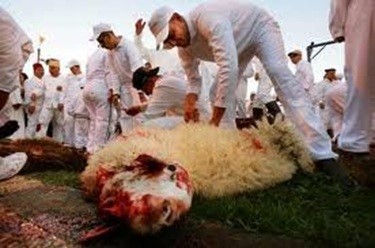The Times of Israel published an intriguing article describing how Christians are beginning to celebrate Passover – complete with the traditional Seder meal. The article states that the largest Seder gatherings (with over 600 together) are being celebrated by Christians along with Jews, a trend that has been developing “within the past 20 or 30 years”. To my mind this raises some worthwhile questions:
Why are Christians celebrating Passover?
According to the article, these are Passover celebrations “in which Yeshua stars as the paschal lamb”. But why would Yeshua be celebrated as the paschal lamb? If we look into the gospels (the eyewitness accounts written by the Jewish followers of Yeshua) we learn when Yeshua was arrested, brought to trial and put to death.

“Then the Jews led Jesus … to the palace of the Roman governor [Pilate]… to avoid ceremonial uncleanness the Jews did not enter the palace; they wanted to be able to eat the Passover” … [Pilate] said [to Jewish leaders] “…But it is your custom for me to release to you one prisoner at the time of the Passover. Do you want me to release ‘the king of the Jews’?”
John 18:28, 39-40
This all happened on Passover Day. In fact, the well-known ‘Last Supper’ of Yeshua was his Seder meal celebrated with his disciples – also on Passover since Passover began at sundown on Thursday evening. With Yeshua Last Seder, arrest, trial, and execution all occurring on Passover there is a direct historical link between Yeshua and Passover.
Moses, Passover & Yeshua
But when one looks back at the account of the first Passover, in the Torah, when Moses led the Hebrews out of Egypt, then this link takes on special meaning. The complete Torah account is here, but when G-d, Blessed be He, explained to Moses how Passover (Pesach) would unfold it states:
For that night, I will pass through the land of Egypt and kill all the firstborn in the land of Egypt, both men and animals; and I will execute judgment against all the gods of Egypt; I am Adonai. 13 The blood will serve you as a sign marking the houses where you are; when I see the blood, I will pass over you — when I strike the land of Egypt, the death blow will not strike you.
Exodus 12:12-13
The blood of the Paschal lambs was a sign to the people, not to G-d. Though G-d would look for the blood, and when He saw it Death would pass over (Pesach), the blood was a sign to ‘serve you’ – the people, and by extension to us who read the account in the Torah. But in what way was the blood a sign to the people? Think what signs do by considering these signs.

When we see the ‘skull and crossbones’ sign it makes us think of death and danger. The sign of the ‘Golden Arches’ makes us think about McDonalds. The ‘√’ on Nadal’s bandana is the sign for Nike. Nike wants us to think of them when we see this on Nadal. Signs are made to direct our thinking not to the sign itself but to what it points to. In that first Passover, death hung over every household in Egypt. Over every Hebrew house as well as all Egyptian houses. But the blood of the Passover lamb, painted on the doorposts, would cause death to pass over. Death today also hangs over every household – Jewish as well as Gentile – since we are all destined to die.
In the eye of his first followers, Yeshua death was seen as a triumph. As one stated
For the Messiah’s love has hold of us, because we are convinced that one man died on behalf of all mankind (which implies that all mankind was already dead), (2 Corinthians 5: 14)
In the same way that the Passover lamb died on behalf of any Hebrew who put its blood on his doorway, Yeshua was understood to have died on our behalf. Thus, not only is there a direct link by calendar date between Passover and Yeshua, but the meaning of the respective deaths were the same. For this reason one of the titles given to Yeshua by his contemporaries was:
The next day John (i.e. John the Baptist) saw Yeshua coming toward him and said, “Look, the Lamb of God, who takes away the sin of the world… ’”. (John 1:29)
Yeshua was designated as the pashal lamb of G-d. So it makes sense that Christians see the Jewish roots of their faith and want to participate in the celebration of Passover.
Why is Easter on a slightly different date than Passover?
Yeshua died on Passover. Easter is the Christian celebration of the death of Yeshua, with Good Friday remembering his death and Easter Sunday recalling his resurrection. In that case should not Easter and Passover occur on the same day? At first they were celebrated on the same day. But In 325 CE the Christian Council of Nicaea established that Easter would be held on the first Sunday after the first full moon occurring on or after equinox on March 21. This changed how Easter was calculated, moving it off from the Passover date. Easter and Passover now are usually very close in the calendar, usually just a few days apart.
Because of this change in the dating of Easter, Christians largely forgot the Jewish Passover roots of Easter. As one of those interviewed for the Times of Israel article said, “A lot of times, Gentile Christians are willfully ignorant, sometimes even surprised by the connections between Judaism and Christianity”. Learning about and celebrating Passover serves to inform Christians about Jewish roots to their faith. The flip-side is also true – with the Christian camouflage that has increasingly been painted on Yeshua, Jews have not been able to see him as Jewish. His Jewishness has been hidden from them.
Is Yeshua a legitimate Jewish pursuit?
There is wide diversity in what it means to be a Jew. A Jew can be secular, orthodox, ultra-orthodox, reformed, conservative, and even an atheist. One can be a Zionist Jew – but one can also be anti-Zionist and still be a Jew. Most Jews are heterosexual but there are LBGT Jews. Some are observant, others not, and still others only partially so. Whatever categories one uses to classify people: whether language, clothing, religion, country of residence, wealth, education, skin color, political views or sexual orientation – Jews will fill in all the categories – and still be considered a Jew. Wrong perhaps, misguided even, but nonetheless accepted as part of that broad family of Abraham.
The Times of Israel Passover article showed that this Jewish diversity now extends so far as to also include the ‘Messianic Jew’. These are Jews who believe that Jesus (Yeshua as they call him) is the Messiah promised in the Tanakh. For centuries this has been considered self-contradictory. If one was a Jew he/she did not think about Yeshua, let alone believe in him, or if one believed in him one could not be a Jew. But it was decisions made long ago, like detaching Easter from Passover, creating medieval ghettos and pogroms in Europe, to the later anti-semitism in the Christian West, that diverted attention away from crucial historical facts:
- Yeshua of Nazareth, arguably the most influential person to have lived on this planet, was a circumcised, practicing Jew descended from Abraham, fully learned in the Torah.
- His immediate followers were also all observant Jews, adhering to the Torah.
- All the books of the Brit Chadasha were written by Jews (with the possible exception of Luke)
At the close of the 2nd Temple Period and even up to the time of the Bar Kokhba (135 CE) rebellion it was a very Jewish preoccupation to discuss, debate and argue over whether Yeshua of Nazareth was the Messiah or not. The Roman Historian Suetonius describes the effect this debate had in Rome.
“As the Jews were making constant disturbances at the instigation of Chrestus, he [Emperor Claudius] expelled them from Rome” (Life of Claudius xxv 4)
In other words, Jews in the city of Rome were discussing and debating about Chrestus (i.e. Yeshua Christ) so intensely that the Roman Emperor Claudius was irritated and expelled all of them (Messianic or not) from Rome (in 49 CE).
Notice how the Jewish Historian Flavius Josephus (writing about 90 CE) writes about James, the brother of Yeshua of Nazareth and the first leader of Yeshua Jewish followers in Jerusalem, (who also wrote the book of James in the Brit Chadasha)
Ananus took the high priesthood, was a bold man in his temper and very insolent; he was also of the sect of Sadduccees, who were very rigid in judging offenders … assembled the Sanhedrin of the judges and brought before them the brother of Jesus, who was called the Christ, whose name was James, and some others, … formed an accusation against them … and delivered them to be stoned. But as for those who seemed the most equitable of the citizens, and such as were the most uneasy at the breach of the laws, they disliked what was done, they also sent to the King (Agrippa) desiring him to send to Ananus that he should act so no more.
Antiquities of the Jews, Book XX, Chapter IX, 1
You can see how the debate went back and forth amongst the Jews concerning James, the brother of Yeshua. No matter what ‘side’ of the debate they were on it was obviously a very Jewish concern. Josephus even writes directly about Yeshua, and in a way that indicates he personally was moved back and forth in this debate
At this time there was a wise man … Jesus. … good, and … virtuous. Many people among the Jews and the other nations became his disciples. Pilate condemned Him to be crucified and to die. But those who had become his disciples did not abandon his discipleship. They reported that He had appeared to them three days after his crucifixion and that He was alive. .. Accordingly, He was perhaps the Messiah, concerning whom the prophets have reported wonders. And the tribe of the Christians, so named after him, has not disappeared to this day…
ANTIQUITIES Book XVIII, III, 3
Whether Yeshua was the Messiah or not, the arguments for and against, can be taken up later. As both Jews and Christians are re-learning the ancient Jewish roots of Easter and the link between Passover and Yeshua, it suffices to remind us that this is an authentic Jewish question, not to be relegated simply for Christian Gentiles to discuss. Passover itself shouts to the Jewishness in the puzzle of this man Yeshua of Nazareth.
Is their writings or documentation from scribes, rabbis, the Sanhedrin, Essenes , Sadducee whoever that CONFIRM the veil was torn from top to bottom at the moment Jesus became the timid? The perpetual sacrifice ? Sources other than New Testament references ?
I am not aware of any outside of New Testament. But the tearing of the veil is a minor point in the whole Gospel narrative
I disagree that you say it was a minor point. It indeed was major as is represents the openness of the (Holy of Holy) thone of God to the Believer, As the blood of Christ, now bridged the gap of separation between God and man,. and pronounced that the redeemed thought the blood of Christ now themselves could come boldly on their own behave and partition the throne of God without the need of the man priest as Christ was now not only the sacrifice but our high priest, seating at the right side of God ready to make intersection for us in a greater temple in which we how can come boldly. Hebrews 2-9
[email protected]